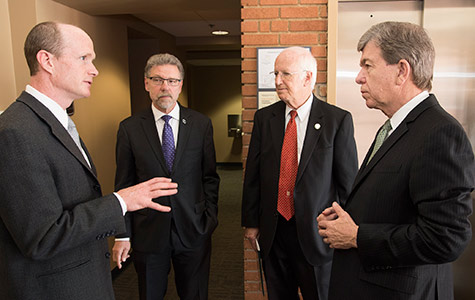
U.S. Sen. Roy Blunt, R-Mo., toured the Charles F. and Joanne Knight Alzheimer’s Disease Research Center (ADRC) earlier this week to learn from physicians, scientists, patients and caregivers about the devastating illness and steps being taken to understand and stop it.
The major theme emerging from Blunt’s visit Monday to Washington University School of Medicine was that although improved treatments are being developed, many whose lives are touched by Alzheimer’s need help now.
Randall J. Bateman, MD, the Charles F. and Joanne Knight Distinguished Professor of Neurology, told Blunt that as scientists better understand the causes of the disease, they can test treatments that may stop the progressive loss of memory and thinking that are the hallmarks of the condition.
Bateman, who directs the Dominantly Inherited Alzheimer’s Network Trials Unit (DIAN-TU), compared the current state of Alzheimer’s research to what was understood about statin drugs in the 1970s. He told Blunt that increased funding for the National Institutes of Health (NIH) could make it possible to find drugs that improve the prognosis for Alzheimer’s patients as significantly as statin drugs improved the lives of heart patients.
Offering a picture of what life is like for those most affected by the disease, Alzheimer’s patients and their caregivers shared personal stories of how the disease had affected them, as Blunt, Bateman, Larry J. Shapiro, MD, executive vice chancellor for medical affairs and dean of the School of Medicine, and Harry Johns, president and CEO of the Alzheimer’s Association, listened.
Trish Williams sat with her husband, Bruce, who was diagnosed with Alzheimer’s disease in 2008.
“We know it’s too late for this research to help my husband,” she said. “But we hope new research may help others in the future avoid the things we’ve had to face.”
Blunt, who chairs a Senate appropriations subcommittee that oversees funding for the Department of Health and Human Services, told those gathered at the ADRC that during his first 10 years in Congress, the budget for NIH was doubled.
“Now we want to create a sustainable way to provide funding to effectively address these issues moving forward,” he said.